Here is a link to a story about a very good friend of mine, Scott Mackler, who I wrote about in my book You’re Stronger Than You Think. Scott was diagnosed with ALS almost 15 years ago. His first symptoms were when he lost grip of a tennis racket, playing against me. And I thought it was just the strength of my forehand! If you want to be inspired, read this story.
Thomas Jefferson on Political Disagreements
“Every difference of opinion is not a difference of principle.”
Why Do Patients Take Their Doctor's Advice?
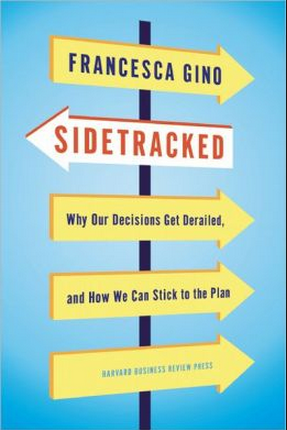 Is it the white coat? That’s what I wondered in medical school when I would find patients asking me for advice on topics they simply had to know more about than me. Mothers would ask me how to get their newborn babies to sleep through the night, asking me even though the one time I babysat I fell asleep on the family’s couch only to be woken up by their 4-year-old, asking me whether it was okay if she went to bed now.
Is it the white coat? That’s what I wondered in medical school when I would find patients asking me for advice on topics they simply had to know more about than me. Mothers would ask me how to get their newborn babies to sleep through the night, asking me even though the one time I babysat I fell asleep on the family’s couch only to be woken up by their 4-year-old, asking me whether it was okay if she went to bed now.
Elderly men and women would ask me how to cope with fear of dying, asking me even though at the ripe old age of twenty-four I had not ever experienced that feeling.
Middle aged women would ask me whether I thought they should get mastectomy or lumpectomy to treat their newly diagnosed breast cancers, asking me even though I knew the decision was not a pure medical judgment but instead depended on their values, and whether they felt that preserving part of their breast was worth six weeks of radiation treatment.
I thought it was simply the white coat and all the knowledge it symbolized. But having just read Francesca Gino’s wonderful new book, Sidetracked: Why Our Decisions Get Derailed, and How We Can Stick to the Plan, I have a much richer understanding of when, and why, people choose to rely on advice… (Read more and view comments at Forbes)
Thomas Jefferson on the Importance of Newspapers
As we watch the newspaper industry die around us, we should reflect on just how important newspapers have been for American democracy. Thomas Jefferson certainly understood this.
“The basis of our governments being the opinion of the people, the very first object should be to keep that right; and were it left to me to decide whether we should have a government without newspapers, or newspapers without a government, I should not hesitate a moment to prefer the latter. But I should mean that every man should receive those papers and be capable of reading them.”
Should Our Government Combat the Obesity Epidemic?
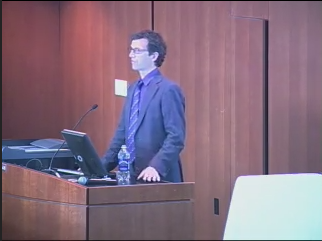 Here is video from a talk I recently gave at the University of Wisconsin, laying out a few of the reasons I think the government needs to play a role in combating the obesity epidemic. If you dig further into the conference website, you will see a video from my opponent in the debate, Jacob Sullum, a libertarian writer at Reason Magazine. I’m going to try to dig around to see if I can find the back and forth we had after we finished both of our talks. It was a healthy debate, but one I definitely won hands down. Or at least I’ve convinced myself of that.
Here is video from a talk I recently gave at the University of Wisconsin, laying out a few of the reasons I think the government needs to play a role in combating the obesity epidemic. If you dig further into the conference website, you will see a video from my opponent in the debate, Jacob Sullum, a libertarian writer at Reason Magazine. I’m going to try to dig around to see if I can find the back and forth we had after we finished both of our talks. It was a healthy debate, but one I definitely won hands down. Or at least I’ve convinced myself of that.
(Click here to view comments)
Cass Sunstein Takes on the Death Panel Myth
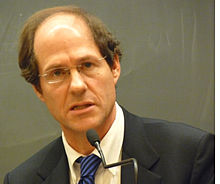 I wrote a while back about some research I conducted with Jason Reifler and Brendan Nyhan on how fact checking influences people’s belief in whether Obamacare created death panels, to decide which old or disabled peoples to kill. Yesterday, Cass Sunstein wrote about our study, and mused on several really interesting related issues. Check out his thoughts here.
I wrote a while back about some research I conducted with Jason Reifler and Brendan Nyhan on how fact checking influences people’s belief in whether Obamacare created death panels, to decide which old or disabled peoples to kill. Yesterday, Cass Sunstein wrote about our study, and mused on several really interesting related issues. Check out his thoughts here.
A Tiny Fraction of People, a Huge Chunk of Medical Spending
Any effort to rein in health care costs needs to account for this graph, showing what percent of medical expenses attributed which group of patients. (Martin Gaynor posted this picture in a recent blog.)
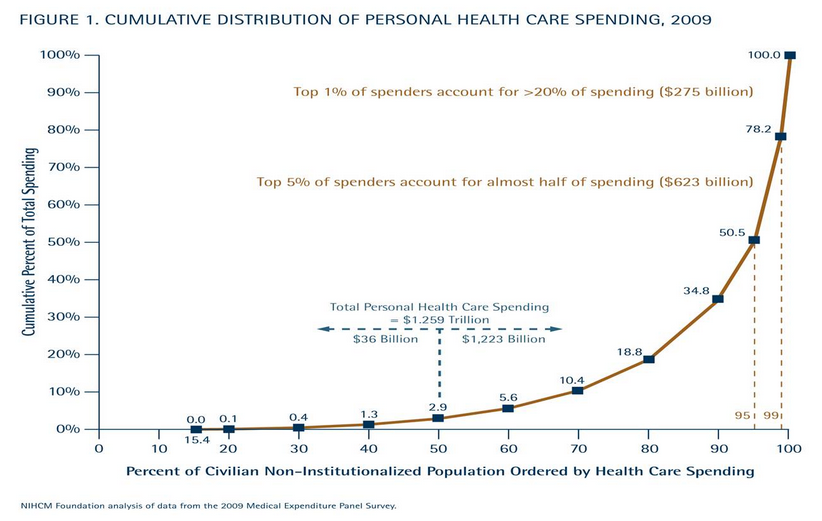 I use another version of this in my teaching:
I use another version of this in my teaching: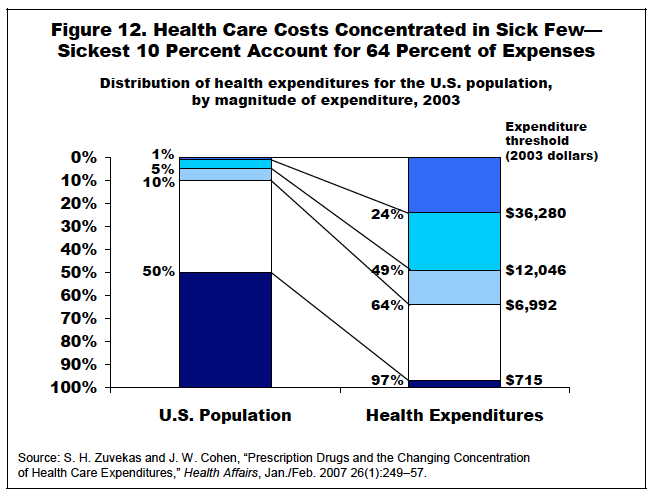 Either way, what we have here is an AMAZING concentration of spending. If we can gain efficiency in caring for the sickest patients, we can cut into run away health care costs. But Gaynor makes another very important point about this concentration of spending: it means that if we hope to reduce health care costs by asking patients to bear a larger percentage of their expenses, we are quickly going to run into problems. These very sick folks will either go bankrupt or they will reach the point where insurance takes over all their costs. (Or, perhaps more likely, both will happen.)
Either way, what we have here is an AMAZING concentration of spending. If we can gain efficiency in caring for the sickest patients, we can cut into run away health care costs. But Gaynor makes another very important point about this concentration of spending: it means that if we hope to reduce health care costs by asking patients to bear a larger percentage of their expenses, we are quickly going to run into problems. These very sick folks will either go bankrupt or they will reach the point where insurance takes over all their costs. (Or, perhaps more likely, both will happen.)Looks like we need to rely on more than “skin in the game” to fix our health care cost problem!
Will the Sequester Cause Oncologists to Lose Money Prescribing Chemotherapy?
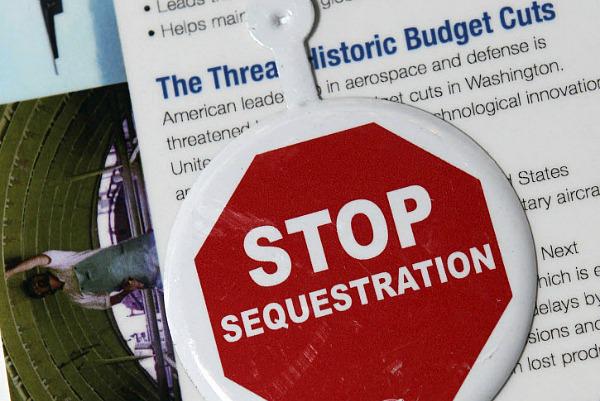 In a recent Washington Post article, Sarah Kliff reported that “Cancer clinics across the country have begun turning away thousands of Medicare patients” because of reductions in reimbursement caused by the sequester. Specifically, oncologists will no longer be able to markup the price of chemotherapy by 6% “to cover the cost of storing and administering” the drugs. As health executive Jeff Vacirca put it: “If we treated the patients receive the most expensive drugs, we’d be out of business in six months to a year.”
In a recent Washington Post article, Sarah Kliff reported that “Cancer clinics across the country have begun turning away thousands of Medicare patients” because of reductions in reimbursement caused by the sequester. Specifically, oncologists will no longer be able to markup the price of chemotherapy by 6% “to cover the cost of storing and administering” the drugs. As health executive Jeff Vacirca put it: “If we treated the patients receive the most expensive drugs, we’d be out of business in six months to a year.”
Is the sequester really going to bankrupt oncologists? And are these oncologists right to stop treating Medicare patients?
There are no easy answers to this question. On one hand, the 6% mark up exerts a disturbing influence on oncologist’s treatment decisions. As I discussed in an earlier post: “This “buy and bill” practice creates an incentive for oncologists to prescribe expensive treatments.” In fact, when a popular chemotherapy drug went generic, oncologists switched to a non-generic competitor, thereby increasing the size of the 6% mark up… (Read more and view comments at Forbes)
On Why Thomas Jefferson Never Committed Suicide
 Upon the death of his wife, Thomas Jefferson went into a deep depression. In crushing words, he described his state of mind to his sister-in-law, in a sentence that could be placed in psychiatric manuals next to a definition of depression:
Upon the death of his wife, Thomas Jefferson went into a deep depression. In crushing words, he described his state of mind to his sister-in-law, in a sentence that could be placed in psychiatric manuals next to a definition of depression:
“All my plans of comfort and happiness reversed by a single event and nothing answering in prospect before me but a gloom unbrightened with one cheerful expectation.”
Nothing to look forward to. No hope for the future. And yet Jefferson would not consider ending his life. He had things to do:
“This miserable kind of existence is really too burdensome to be borne, and were it not for the infidelity of deserting the sacred charge left me, I could not wish its continuance a moment.”
That sacred charge? He had children to raise. Thank God!
Thomas Jefferson, On Being Afraid of Girls
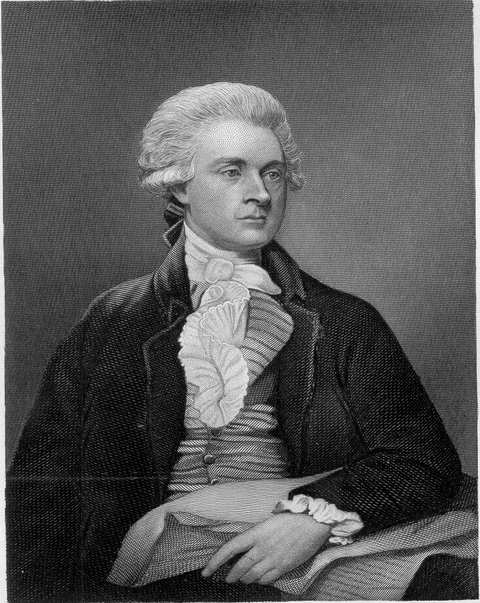 In his youth, Jefferson didn’t lack for confidence except, it seems, when smitten by an attractive girl. One night at a dance, he worked up a bunch of things he could say to a girl named Rebecca who he was hoping to become acquainted with: “I was prepared to say a great deal: I had dressed up in my own mind such thoughts as occurred to me, in as moving language as I knew how, and expected to have performed in a tolerably creditable manner.” Let’s face it: if anyone could impress a girl with eloquence, it would have been Jefferson. But things didn’t go so well, and here’s how Jefferson described that in a letter he wrote the next day:
In his youth, Jefferson didn’t lack for confidence except, it seems, when smitten by an attractive girl. One night at a dance, he worked up a bunch of things he could say to a girl named Rebecca who he was hoping to become acquainted with: “I was prepared to say a great deal: I had dressed up in my own mind such thoughts as occurred to me, in as moving language as I knew how, and expected to have performed in a tolerably creditable manner.” Let’s face it: if anyone could impress a girl with eloquence, it would have been Jefferson. But things didn’t go so well, and here’s how Jefferson described that in a letter he wrote the next day:
“But, good God! When I had an opportunity of venting them [the words he had prepared], a few broken sentences, uttered in great disorder, and interrupted with pauses of uncommon length, were the two visible signs of my strange confusion!”
(Click here to view comments)
